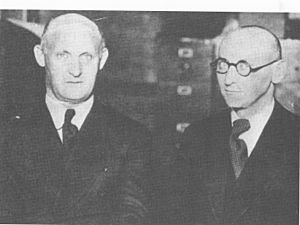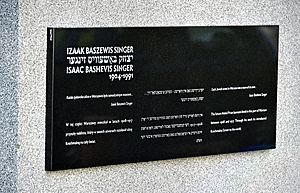Isaac Bashevis Singer facts for kids
Quick facts for kids
Isaac Bashevis Singer
|
|
|---|---|
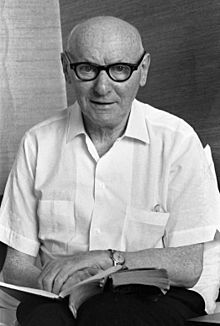
Isaac Bashevis Singer in 1969
|
|
| Born | Izaak Zynger November 11, 1903 Leoncin, Congress Poland, Russian Empire |
| Died | July 24, 1991 (aged 87) Surfside, Florida, United States |
| Pen name | Bashevis, Warszawski (pron. Varshavsky), D. Segal |
| Occupation | Novelist, short story writer |
| Language | Yiddish |
| Citizenship | Poland, United States |
| Genre | Fictional prose |
| Notable works | The Magician of Lublin A Day of Pleasure |
| Notable awards | Nobel Prize in Literature 1978 |
| Signature | |
 |
|
Isaac Bashevis Singer (Yiddish: יצחק באַשעװיס זינגער; November 11, 1903 – July 24, 1991) was a Polish-born Jewish-American dramatist, novelist, playwright, satirist, and translator. He wrote and published first in Yiddish and later translated his own works into English with the help of editors and collaborators. He was awarded the Nobel Prize for Literature in 1978. A leading figure in the Yiddish literary movement, he was awarded two U.S. National Book Awards, one in Children's Literature for his memoir A Day of Pleasure: Stories of a Boy Growing Up in Warsaw (1970) and one in Fiction for his collection A Crown of Feathers and Other Stories (1974).
Contents
Life
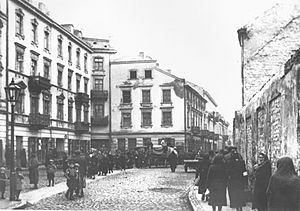
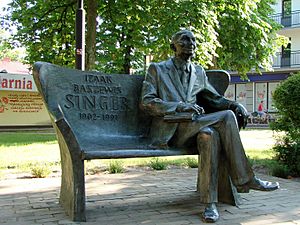
Isaac Bashevis Singer was born in 1903 to a Jewish family in Leoncin village near Warsaw, Poland. The Polish form of his birth name was Icek Hersz Zynger. The exact date of his birth is uncertain, but most sources say it was probably November 11, a date similar to the one that Singer gave to his official biographer Paul Kresh, his secretary Dvorah Telushkin, and Rabbi William Berkowitz. The year 1903 is consistent with the historical events that his brother refers to in their childhood memoirs, including the death of Theodor Herzl. The often-quoted birth date, July 14, 1904 was made up by the author in his youth, possibly to make himself younger to avoid the draft.
His father was a Hasidic rabbi and his mother, Bathsheba, was the daughter of the rabbi of Biłgoraj. Singer later used her first name in an initial literary pseudonym, Izaak Baszewis, which he later expanded. Both his older siblings, sister Esther Kreitman (1891–1954) and brother Israel Joshua Singer (1893–1944), became writers as well. Esther was the first of the family to write stories.
The family moved to the court of the Rabbi of Radzymin in 1907, where his father became head of the Yeshiva. After the Yeshiva building burned down in 1908, the family moved to Warsaw, a flat at Krochmalna Street 10. In the spring of 1914, the Singers moved to No. 12.
The street where Singer grew up was located in the impoverished, Yiddish-speaking Jewish quarter of Warsaw. There his father served as a rabbi, and was called on to be a judge, arbitrator, religious authority and spiritual leader in the Jewish community. The unique atmosphere of pre-war Krochmalna Street can be found both in the collection of Varshavsky-stories, which tell stories from Singer's childhood, as well as in those novels and stories which take place in pre-war Warsaw.
World War I
In 1917, because of the hardships of World War I, the family split up. Singer moved with his mother and younger brother Moshe to his mother's hometown of Biłgoraj, a traditional shtetl, where his mother's brothers had followed his grandfather as rabbis. When his father became a village rabbi again in 1921, Singer returned to Warsaw. He entered the Tachkemoni Rabbinical Seminary and soon decided that neither the school nor the profession suited him. He returned to Biłgoraj, where he tried to support himself by giving Hebrew lessons, but soon gave up and joined his parents, considering himself a failure. In 1923, his older brother Israel Joshua arranged for him to move to Warsaw to work as a proofreader for the Jewish magazine Literarishe Bleter, of which the brother was an editor.
United States
In 1935, four years before the Nazi invasion, Singer emigrated from Poland to the United States. He was fearful of the growing threat in neighboring Germany. The move separated the author from his common-law first wife Runia Pontsch and son Israel Zamir (1929–2014); they emigrated to Moscow and then Palestine. The three met again in 1955.
Singer settled in New York City, where he took up work as a journalist and columnist for The Jewish Daily Forward (פֿאָרװערטס), a Yiddish-language newspaper. After a promising start, he became despondent and for some years felt "Lost in America" (title of his 1974 memoir published in Yiddish; published in English in 1981).
In 1938, he met Alma Wassermann née Haimann (1907–1996), a German-Jewish refugee from Munich. They married in 1940, and their union seemed to release energy in him; he returned to prolific writing and to contributing to the Forward. In addition to his pen name of "Bashevis", he published under the pen names of "Warszawski" (pron. Varshavsky) during World War II, and "D. Segal". They lived for many years in the Belnord apartment building on Manhattan's Upper West Side.
In 1981, Singer delivered a commencement address at the University at Albany, and was presented with an honorary doctorate.
Singer died on July 24, 1991, in Surfside, Florida, after suffering a series of strokes. He was buried in Cedar Park Cemetery, Paramus, New Jersey. A street in Surfside, Florida is named Isaac Singer Boulevard in his honor; and so is a city square in Lublin, Poland, and a street in Tel-Aviv. The full academic scholarship for undergraduate students at the University of Miami is also named in his honor.
Literary career
Singer's first published story "Oyf der elter" ("In Old Age", 1925) won the literary competition of the Literarishe Bletter, where he worked as a proofreader. Singer published his first novel, Satan in Goray, in 1935. In his later work The Slave (1962), Singer tells a love story of a Jewish man and a gentile woman.
Language
Singer always wrote and published in Yiddish. His novels were serialized in newspapers, which also published his short stories. He edited his novels and stories for publication in English, which was used as the basis for translation into other languages. He referred to his English versions as his "second original". Some of Singer's stories and novels have not been translated.
Illustrators
The artists who have illustrated Singer's novels, short stories, and children's books, include Raphael Soyer, Maurice Sendak, Larry Rivers, and Irene Lieblich. Singer personally selected Lieblich to illustrate two of his books for children, A Tale of Three Wishes and The Power of Light: Eight Stories for Hanukkah, after seeing her paintings at an Artists Equity exhibition in New York City. A Holocaust survivor, Lieblich was from Zamosc, Poland, a town adjacent to the area where Singer was raised. As their memories of shtetl life were so similar, Singer found Lieblich's images ideally suited to illustrate his texts. Of her style, Singer wrote that "her works are rooted in Jewish folklore and are faithful to Jewish life and the Jewish spirit."
Summary
Singer published at least 18 novels, 14 children's books, a number of memoirs, essays and articles. He is best known as a writer of short stories, which have been published in more than a dozen collections. The first collection of Singer's short stories in English, Gimpel the Fool, was published in 1957. The title story was translated by Saul Bellow and published in May 1953 in the Partisan Review. Selections from Singer's "Varshavsky-stories" in the Daily Forward were later published in anthologies such as My Father's Court (1966). Later collections include A Crown of Feathers (1973), with notable masterpieces in between, such as The Spinoza of Market Street (1961) and A Friend of Kafka (1970). His stories and novels reflect the world of the East European Jewry in which he grew up. After his many years in America, his stories also portrayed the world of the immigrants and their pursuit of an elusive American dream, which seems always beyond reach.
Prior to Singer's winning the Nobel Prize, English translations of dozens of his stories were published in popular magazines such as Esquire that published literary works.
Throughout the 1960s, Singer continued to write about questions of personal morality. Because of the controversial aspects of his plots, he was a target of scathing criticism.
Singer was awarded the Nobel Prize in 1978.
Between 1981 and 1989, Singer contributed articles to Moment Magazine, an independent magazine which focuses on the life of the American Jewish community.
Film adaptations
His novel Enemies, a Love Story was adapted as a film by the same name (1989) and was quite popular, bringing new readers to his work. It features a Holocaust survivor who deals with varying desires, complex family relationships, and a loss of faith.
Singer's story, "Yentl, the Yeshiva Boy" was adapted into a stage version by Leah Napolin (with Singer), which was the basis for the film Yentl (1983) starring and directed by Barbra Streisand.
Alan Arkin starred as Yasha, the principal character in the film version of The Magician of Lublin (1979), which also featured Shelley Winters, Louise Fletcher, Valerie Perrine and Lou Jacobi. In the final scene, Yasha achieves his lifelong ambition of being able to fly, though not as the magic trick he had originally planned.
Perhaps the most fascinating Singer-inspired film is Mr. Singer's Nightmare and Mrs. Pupkos Beard (1974) directed by Bruce Davidson, a renowned photographer who became Singer's neighbor. This unique film is a half-hour mixture of documentary and fantasy for which Singer wrote the script and played the leading role.
The 2007 film Love Comes Lately, starring Otto Tausig, was adapted from several of Singer's stories.
Legacy and honors
- Jewish Book Council for The Slave, 1963
- Itzik Manger Prize, 1973
- National Book Award (United States), 1974
- Nobel Prize for Literature, 1978
- A street in Surfside, Florida named in his honor
- A street in New York City named in his honor (W. 86th st.)
- A street in Leoncin named in his honor (ul. Isaaca Bashevisa Singera)
- A commemorative plaque attached to a front wall of a building resided by Isaac Singer and his family during their dwelling in Radzymin (ul. Stary Rynek 7, 05-250 Radzymin)
- A park square in Radzymin named in his honor (skwer im. Isaaca Bashevisa Singera)
- A city square in Lublin, a hometown of the protagonist of The Magician of Lublin novel, named in writer's honor (pl. Isaaka Singera)
- A street in Biłgoraj named in his honor (ul. Isaaca Bashevisa Singera)
- Induction into the Jewish-American Hall of Fame
Singer is the only American Nobel Laureate in Literature to not receive a Pulitzer Prize award or citation.
Published works
Note: Publication dates refer to English editions, not the Yiddish originals, which often predate the versions in translation by 10 to 20 years.
Novels
- Satan in Goray (serialized: 1933, book: 1935)—Yiddish original: דער שטן אין גאריי
- Eulogy to a Shoelace—Yiddish original: די קלײנע שוסטערלעך
- The Family Moskat (1950)—Yiddish original: די פאמיליע מושקאט
- The Magician of Lublin (1960)—Yiddish original: דער קונצנמאכער פון לובלין
- The Slave (1962)—Yiddish original: דער קנעכט
- The Manor (1967)
- The Estate (1969)
- Enemies, a Love Story (1972)—Yiddish original: שׂונאים. געשיכטע פֿון אַ ליבע
- The Wicked City (1972)
- Shosha (1978)
- Old Love (1979)
- Reaches of Heaven: A Story of the Baal Shem Tov (1980)
- The Penitent (1983)—Yiddish original: דער בעל תשובה
- Teibele and Her Demon (1983) (play)
- The King of the Fields (1988)
- Scum (1991)
- The Certificate (1992)
- Meshugah (1994)
- Shadows on the Hudson (1997)
Short story collections
- Gimpel the Fool and Other Stories (1957)—Yiddish original: גימפּל תּם
- The Spinoza of Market Street (1961)
- Short Friday and Other Stories (1963)
- The Séance and Other Stories (1968)
- A Friend of Kafka and Other Stories (1970)
- The Fools of Chelm and Their History (1973)
- A Crown of Feathers and Other Stories (1974)—shared the National Book Award, fiction, with Gravity's Rainbow by Thomas Pynchon
- Passions and Other Stories (1975)
- Old Love (1979)
- The Collected Stories (1982)
- The Image and Other Stories (1985)
- The Death of Methuselah and Other Stories (1988)
Juvenile literature
- Zlateh the Goat and Other Stories, illustrated by Maurice Sendak (1966) – runner up for the Newbery Medal (Newbery Honor Book)
- Mazel and Shlimazel, illus. Margot Zemach (1967)
- The Fearsome Inn, illus. Nonny Hogrogian (1967) – Newbery Honor Book
- When Shlemiel Went to Warsaw and Other Stories, illus. Margot Zemach (1968) – Newbery Honor Book—Yiddish original: ווען שלימואל איז געגאנגען קיין ווארשע
- The Golem, illus. Uri Shulevitz (1969)
- Elijah the Slave: A Hebrew Legend Retold, illus. Antonio Frasconi (1970)
- Joseph and Koza: or the Sacrifice to the Vistula, illus. Symeon Shimin (1970)
- Alone in the Wild Forest, illus. Margot Zemach (1971)
- The Topsy-Turvy Emperor of China, illus. William Pène du Bois (1971)
- The Wicked City, illus. Leonard Everett Fisher (1972)
- The Fools of Chelm and Their History, illus. Uri Shulevitz (1973)
- Why Noah Chose the Dove, illus. Eric Carle (1974)
- A Tale of Three Wishes, illus. Irene Lieblich (1975)
- Naftali the Storyteller and His Horse, Sus, illus. Margot Zemach (1976)
- The Power of Light – Eight Stories for Hanukkah, illus. Irene Lieblich (1980)
- Yentl the Yeshiva Boy, illus. Uri Shulevitz (1983)
- Stories for Children (1984) – collection
- Shrew Todie and Lyzer the Miser and Other Children's Stories (1994)
- The Parakeet Named Dreidel (2015)
Nonfiction
- The Hasidim (1973)
Autobiographical writings
- Yiddish original: מיין טאטנ'ס בית דין שטוב
- National Book Award, Children's Literature
Films and stage productions based on Singer's work
- Enemies, A Love Story (1989)
- Love Comes Lately (2007)
- The Magician of Lublin (1979)
- Yentl (1983)
- Mr. Singer's Nightmare or Mrs. Pupkos Beard
- Fool's Paradise
See also
 In Spanish: Isaac Bashevis Singer para niños
In Spanish: Isaac Bashevis Singer para niños
- Jewish vegetarianism
- List of animal rights advocates
- List of Jewish Nobel laureates
- List of Poles


